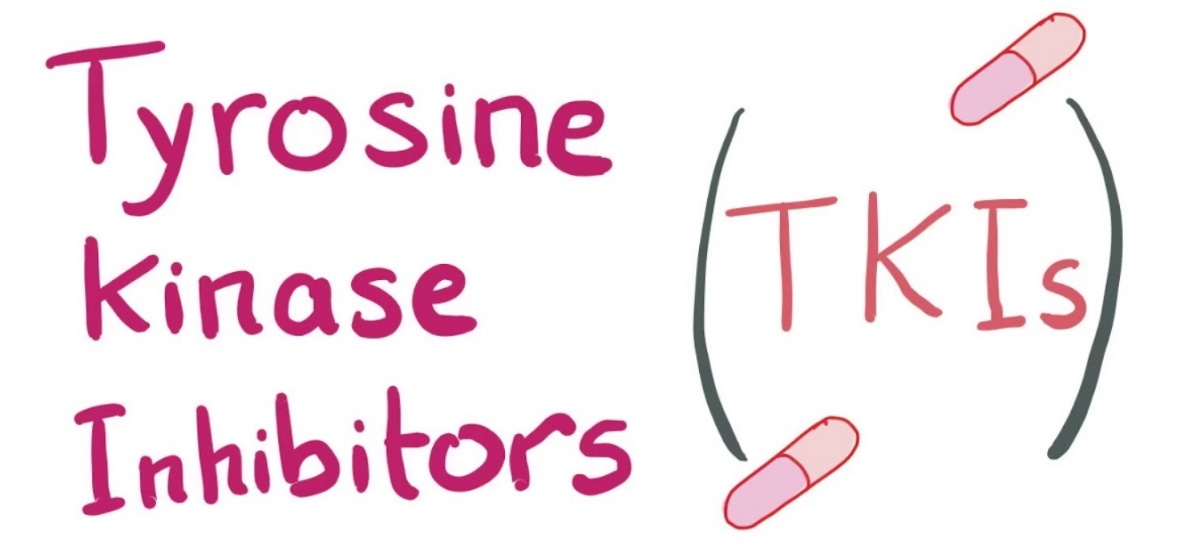Tyrosine kinase inhibitors (TKIs) are a group of targeted cancer therapies that play a significant role in treating various types of cancer. Tyrosine kinases are enzymes that regulate cell growth, proliferation, and survival.
In cancer cells, these enzymes are often overexpressed or mutated, causing uncontrolled cell growth and the development of cancer. TKIs act by stopping this growth signal, leading to the control of cancer.
The role of tyrosine kinase inhibitors in cancer treatment is as follows:
- Targeting specific mutations: TKIs are designed to target specific mutations or alterations in tyrosine kinase enzymes related to the development and progression of certain cancer types. For example, imatinib is a TKI targeting the BCR-ABL fusion protein, a hallmark of chronic myelogenous leukaemia (CML).
- Inhibiting cell growth and proliferation: By targeting and inhibiting the activity of tyrosine kinases, TKIs can effectively block the signalling pathways that drive cancer cell growth and proliferation. This can lead to the slowing or even the regression of tumour growth.
- Improving patient outcomes: TKIs have been shown to significantly improve patient outcomes in various types of cancer, including CML, non-small cell lung cancer, breast cancer, and others. In many cases, TKIs have become the standard of care for these cancers, replacing or complementing traditional chemotherapy and radiation treatments.
- Overcoming drug resistance: Some cancer cells can develop resistance to traditional chemotherapy drugs. TKIs can effectively overcome this resistance by targeting different pathways or specific mutations that confer drug resistance.
- Targeted and personalized treatment: TKIs are considered a form of personalized or targeted cancer therapy, as they are designed to target specific molecular alterations in cancer cells. This allows for more effective and less toxic treatment approaches compared to traditional chemotherapy.
Overall, tyrosine kinase inhibitors’ role in cancer treatment is to provide a targeted and effective therapy that can improve patient outcomes, reduce the side effects of traditional treatments, and address the challenges of drug resistance in certain cancer types.
TKIs have been extensively studied and used in the treatment of various malignancies. Brief overview of the role of TKIs in different types of cancer:
1. Chronic Myelogenous Leukemia (CML):
- TKIs, such as Imatinib, Nilotinib, and Dasatinib, are the standard of care for the treatment of CML.
- These TKIs target the BCR-ABL fusion protein, which is the driving mutation in CML.
- TKIs have significantly improved the prognosis and survival rates of CML patients.
2. Non-Small Cell Lung Cancer (NSCLC):
- TKIs, such as Erlotinib, Gefitinib, and Osimertinib, are used to treat NSCLC patients with specific genetic mutations, such as EGFR mutations.
- These TKIs target the EGFR signaling pathway, often dysregulated in NSCLC.
- TKIs have shown improved response rates and progression-free survival compared to traditional chemotherapy.
3. Breast Cancer:
- TKIs, such as lapatinib, have been approved for the treatment of HER2-positive breast cancer.
- These TKIs target the HER2 receptor, which is overexpressed in a subset of breast cancer patients.
- TKIs can be combined with other therapies, such as trastuzumab, to enhance the treatment efficacy.
4. Gastrointestinal Stromal Tumors (GIST):
- Imatinib, a TKI, is the standard first-line treatment for advanced or metastatic GIST.
- GIST is often driven by mutations in the KIT or PDGFRA genes, which are targeted by Imatinib.
- TKIs have significantly improved the prognosis and survival of GIST patients.
- Renal Cell Carcinoma:
- TKIs, such as Sunitinib, Pazopanib, and Axitinib, are used to treat advanced or metastatic renal cell carcinoma.
- These TKIs target the VEGF signalling pathway, crucial for tumour angiogenesis and growth.
- TKIs have become an important part of the treatment landscape for renal cell carcinoma.
The widespread use of TKIs in various malignancies highlights their importance as targeted and effective cancer therapies. As research continues, new TKIs and combinations are being developed to further improve patient outcomes across different cancer types.

